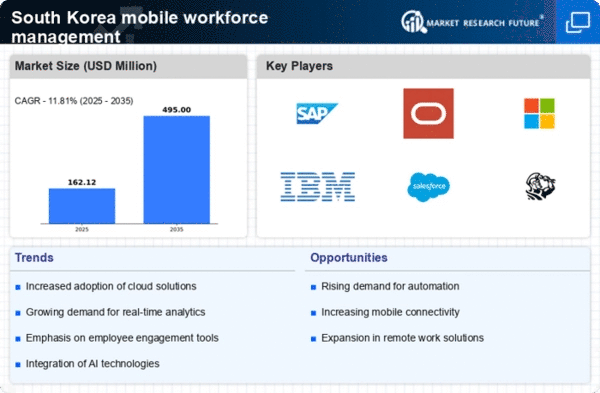Growing Emphasis on Data Analytics
The mobile workforce-management market in South Korea is being influenced by a growing emphasis on data analytics. Organizations are increasingly leveraging data-driven insights to make informed decisions regarding workforce allocation and performance management. The ability to analyze workforce data in real-time allows companies to identify trends, optimize resource utilization, and enhance overall productivity. As of 2025, it is estimated that around 40% of businesses are utilizing analytics tools within their mobile workforce-management systems. This trend not only aids in improving operational efficiency but also supports strategic planning and forecasting. As the importance of data analytics continues to rise, the mobile workforce-management market is likely to see increased investment in solutions that offer robust analytical capabilities.
Increased Focus on Operational Efficiency
The mobile workforce-management market is witnessing a heightened focus on operational efficiency among South Korean enterprises. Companies are increasingly recognizing that optimizing workforce management can lead to significant cost savings and improved service delivery. Recent data indicates that organizations utilizing mobile workforce-management solutions have reported up to a 20% reduction in operational costs. This efficiency is achieved through better resource allocation, real-time tracking, and enhanced communication capabilities. As businesses strive to remain competitive in a dynamic market, the demand for solutions that streamline operations is likely to grow. Consequently, the mobile workforce-management market is expected to expand as organizations seek to implement tools that enhance their operational frameworks and drive productivity.
Regulatory Compliance and Risk Management
The mobile workforce-management market is also being shaped by the need for regulatory compliance and effective risk management in South Korea. As businesses face increasing scrutiny regarding labor laws and data protection regulations, there is a pressing need for solutions that ensure compliance. Companies are investing in mobile workforce-management tools that provide features for tracking employee hours, managing payroll, and ensuring adherence to legal requirements. This focus on compliance is expected to drive market growth, as organizations seek to mitigate risks associated with non-compliance. Furthermore, the integration of compliance features within mobile solutions enhances transparency and accountability, which are critical in maintaining trust with stakeholders. As regulatory landscapes evolve, the demand for compliant mobile workforce-management solutions is likely to increase.
Rising Demand for Flexible Work Arrangements
In South Korea, the mobile workforce-management market is being propelled by a growing demand for flexible work arrangements. As organizations recognize the importance of work-life balance, they are increasingly adopting mobile solutions that allow employees to work remotely or on-the-go. This shift is reflected in a reported 25% increase in the use of mobile workforce-management tools among companies seeking to accommodate diverse working styles. The ability to manage tasks and communicate effectively from various locations is becoming essential for maintaining productivity. Furthermore, this trend aligns with the preferences of younger generations entering the workforce, who prioritize flexibility and autonomy. As a result, businesses are likely to continue investing in mobile workforce-management solutions to attract and retain talent, thereby fostering a more adaptable work environment.
Technological Advancements in Mobile Solutions
The mobile workforce-management market in South Korea is experiencing a surge due to rapid technological advancements. Innovations in mobile applications and cloud computing are enabling organizations to streamline operations and enhance productivity. As of 2025, it is estimated that the adoption of mobile solutions has increased by approximately 30%, allowing businesses to manage their workforce more efficiently. This trend is particularly evident in sectors such as logistics and field services, where real-time data access is crucial. The integration of advanced mobile technologies facilitates better communication and collaboration among teams, thereby improving overall operational efficiency. Consequently, organizations are increasingly investing in mobile workforce-management solutions to leverage these technological benefits, which is likely to drive market growth in the coming years.
















